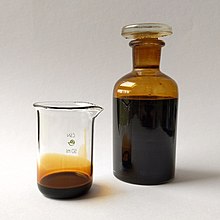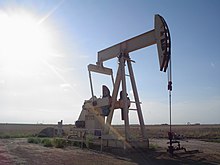
Back Ruolie Afrikaans Erdöl ALS ፔትሮሊየም Amharic Petrolio AN نفط Arabic ܢܦܛܐ ARC پيطرول ARY بترول ARZ Petroleu AST Нарт AV
Petroleum, also known as crude oil or simply oil, is a naturally occurring yellowish-black liquid mixture of mainly hydrocarbons,[1] and is found in geological formations. The name petroleum covers both naturally occurring unprocessed crude oil and petroleum products that consist of refined crude oil.
Petroleum is primarily recovered by oil drilling. Drilling is carried out after studies of structural geology, sedimentary basin analysis, and reservoir characterisation. Unconventional reserves such as oil sands and oil shale exist.
Once extracted, oil is refined and separated, most easily by distillation, into innumerable products for direct use or use in manufacturing. Products include fuels such as petrol (gasoline), diesel, kerosene and jet fuel; asphalt and lubricants; chemical reagents used to make plastics; solvents, textiles, refrigerants, paint, synthetic rubber, fertilizers, pesticides, pharmaceuticals, and thousands of others. Petroleum is used in manufacturing a vast variety of materials essential for modern life,[2] and it is estimated that the world consumes about 100 million barrels (16 million cubic metres) each day. Petroleum production can be extremely profitable and was critical to global economic development in the 20th century, with some countries, so-called "oil states", gaining significant economic and international power because of their control of oil production.
Petroleum exploitation can be damaging to the environment and human health. Extraction, refining and burning of petroleum fuels all release large quantities of greenhouse gases, so petroleum is one of the major contributors to climate change. Other negative environmental effects include direct releases, such as oil spills, and as well as air and water pollution at almost all stages of use. These environmental effects have direct and indirect health consequences for humans. Oil has also been a source of internal and inter-state conflict, leading to both state-led wars and other resource conflicts. Production of petroleum is estimated to reach peak oil before 2035[3] as global economies lower dependencies on petroleum as part of climate change mitigation and a transition towards renewable energy and electrification.[4] Oil has played a key role in industrialization and economic development.[5]
- ^ "EIA Energy Kids – Oil (petroleum)". www.eia.gov. Archived from the original on July 7, 2017. Retrieved March 18, 2018.
- ^ Krauss, Clifford; Mouawad, Jad (March 1, 2011). "Libyan tremors threaten to rattle the oil world". The Hindu. Chennai, India. Archived from the original on March 6, 2011.
- ^ Bullard, Nathaniel (December 9, 2021). "Peak Oil Demand Is Coming But Not So Soon". BNN, Bloomberg News. Retrieved December 11, 2021.
- ^ R, Tom; all; Warren, Hayley. "Peak Oil Is Already Here". Bloomberg.com. Archived from the original on December 18, 2020. Retrieved December 31, 2020.
- ^ "The Economic Benefits of Oil & Gas". Department of Energy. Archived from the original on March 31, 2024. Retrieved March 31, 2024.
© MMXXIII Rich X Search. We shall prevail. All rights reserved. Rich X Search


